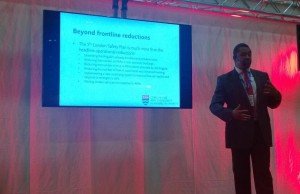 The word fire in a fireman’s job title will become as redundant the word sale in salesman.
The word fire in a fireman’s job title will become as redundant the word sale in salesman.
That was the message from James Cleverly, Chairman of the London Fire and Emergency Planning Authority who was speaking at the FIREX exhibition at the EXCEL in London.
Cleverly was adamant that those working in the Fire Services in London would have to adapt to the changing nature of emergencies within the capital.
“We are close to a tipping point” said Cleverly as he made his case for the need to change and the planned reductions.
Putting things into context the fire chief pointed out how:
“There are over 50% less fires and 35% fewer incidents for the fire brigade than 10 years ago.”
“The number of fires occurring (27,000 in 2011) is the lowest at any time in the last 40 years.”
“False alarms make up 48% of all calls that the fire brigade attends.”
“Fewer people die in fires- 56 on average per year from 2002-2012 compared with an average 80 a year from 1991 to 2001.”
In response to the false alarms Cleverly announced how the fire service had implemented a charging regime to deal with the problem offenders which he said were mostly public sector organisations.
“I am not hoping to make money out of this but to get firms to take more responsibility and steps to reduce such occurrences.”
The Fire Service was also having to keep up with the changes in the London. “London is getting taller and the traditional methods of fire-fighting would not work in high rise buildings”, said Cleverly.
He cited the example of the Shard saying London’s Fire Service were, “literally and metaphorically part of the project every step of the way from the ground up.”
Among the innovations Cleverly hoped to bring in were sprinkler systems in domestic properties as well as bringing different emergency services together under the same location to promote more cooperation and efficient response.
Another innovation Cleverly is keen on is to keep the Fire Service response in line with technology changes.
“In the future when people want to alert the fire service they can take a photo on their smart phones which would be geo-stamped and sent to the response centres.”
The advantage of this according to Cleverly would be to allow fire fighters to have graphic information of what they were up against and to respond in the most effective method and take the right kit.
The post Fifth London Safety Plan: James Cleverly at FIREX International 2014 appeared first on IFSEC Global.

